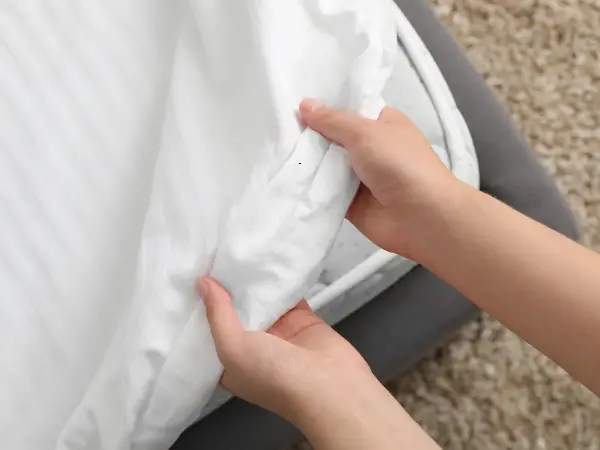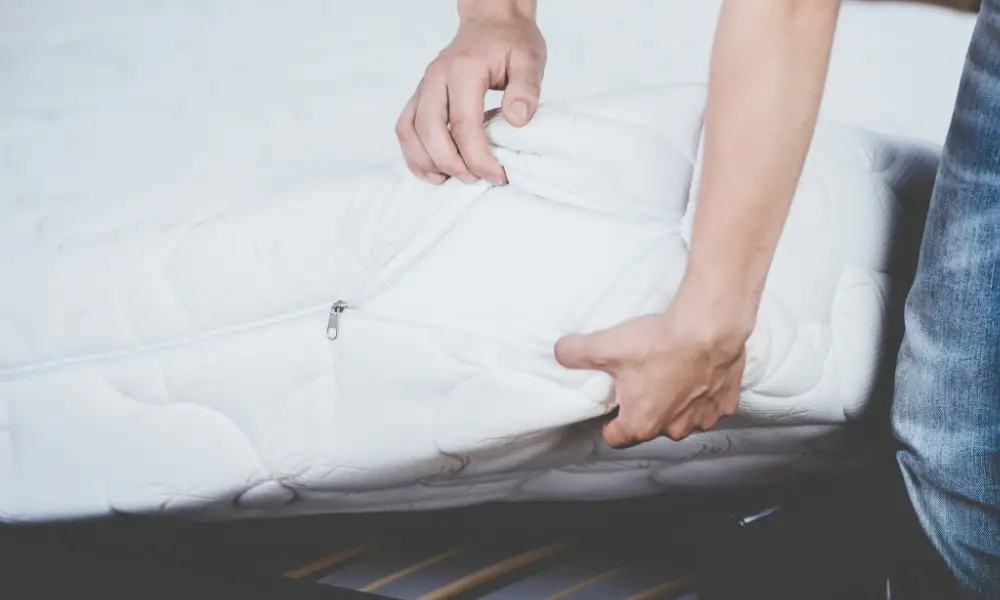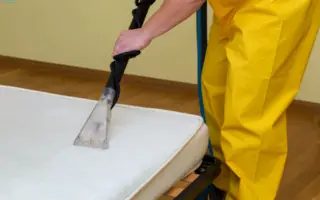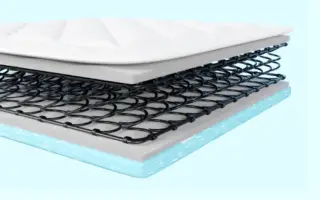Rust occurs when metal parts of your mattress or bed frame come into contact with water. Moisture can come from spills, humidity, or even sweat.
This guide will explore how rust develops on your mattress and offer practical tips to stop it from happening. Keep your sleep space fresh and clean for better rest.
What Causes Rust On A Mattress?
Rust on your mattress can be a surprising problem. It often happens without warning. Understanding what causes rust on a mattress helps in preventing it. Here are some main reasons why rust appears on mattresses.
Moisture Build-up And Humidity Levels
Moisture is a major cause of rust on mattresses. High humidity levels in your home can lead to moisture build-up. This moisture settles on metal parts of the mattress, like springs or frames.
Here are some key points about moisture and humidity:
- Humidity levels above 60% can create a damp environment.
- Condensation forms when warm air meets cool surfaces.
- Wet bedding or spills can increase moisture levels.
To control moisture, consider using a dehumidifier. You can also:
- Ensure good ventilation in your bedroom.
- Use moisture-absorbing products, like silica gel packets.
- Regularly check for leaks in your home.
Keeping humidity low stops rust before it starts.
Metal Components In Your Mattress
Many mattresses have metal components, like coils or frames. These parts are at risk of rusting. Moisture reacts with metal, leading to rust. Understanding the types of metal used can help.
Common metals in mattresses include:
| Metal Type | Rust Resistance |
|---|---|
| Steel | Low, prone to rust |
| Stainless Steel | High, less prone to rust |
| Aluminum | Moderate, may corrode |
Choosing mattresses with rust-resistant metals can help. Regular maintenance is also important. Check for signs of rust regularly. Clean metal parts with a dry cloth to remove moisture.
Poor Mattress Care And Storage Practices
How you care for your mattress matters. Poor care can lead to rust. Not rotating or flipping your mattress can wear it down. Storing your mattress in a damp place is also harmful.
Follow these care tips:
- Rotate your mattress every three months.
- Keep it dry and clean.
- Use a mattress protector to shield against spills.
Proper storage is also key. Avoid storing your mattress in basements or attics where moisture can build up. Always store it on a flat surface, not on its side.
Taking these steps helps keep your mattress rust-free.

Will Rust Spread On A Mattress?
Rust can appear on a mattress frame or even the mattress itself. Understanding how rust forms is important. Knowing the factors that influence its spread can help prevent further damage.
How Rust Forms And Expands
Rust is a type of corrosion that happens when metal reacts with moisture and oxygen. This process is called oxidation. Here are the main stages of how rust forms:
- Moisture Exposure: Metal parts of the mattress frame get wet.
- Oxygen Interaction: Oxygen in the air combines with the metal.
- Oxidation Reaction: A chemical reaction occurs, producing rust.
The rusting process can expand quickly. Once it starts, it can spread to nearby areas. Several factors can affect how fast this happens. Here is a simple table explaining the stages of rust formation:
| Stage | Description |
|---|---|
| 1 | Metal surface gets wet. |
| 2 | Oxygen begins to react with the metal. |
| 3 | Rust forms as a result of oxidation. |
| 4 | Rust spreads to surrounding areas. |
Rust can damage the mattress and the frame. It can weaken the metal and cause structural issues. Regular cleaning and maintenance can help stop rust from forming.
Factors That Influence Rust Spread
Rust does not spread on its own. Several factors can speed up the process. Understanding these factors can help protect your mattress.
- Humidity Levels: High humidity increases rust risk.
- Temperature: Warm temperatures can accelerate rusting.
- Material Quality: Low-quality metal rusts faster.
- Protective Coatings: Absence of coatings allows rust to form.
Here is a table showing how each factor impacts rust spread:
| Factor | Impact on Rust Spread |
|---|---|
| Humidity Levels | Higher humidity leads to more moisture. |
| Temperature | Warmer conditions speed up oxidation. |
| Material Quality | Poor quality metals rust quickly. |
| Protective Coatings | Coatings prevent moisture contact. |
Preventative measures can be effective. Keep the mattress dry and clean. Use covers for added protection. Monitor the environment to reduce humidity.
Dangers Of Rust On A Mattress
Understanding the dangers of rust on a mattress is important for everyone. It helps to keep your sleeping environment safe and comfortable.
Impact On Mattress Longevity
Rust can greatly reduce the lifespan of your mattress. When metal parts rust, they weaken and break down. This affects the mattress’s support and comfort. Here are some key points:
- Structural Damage: Rust weakens metal components.
- Uneven Surfaces: Rust causes bumps and dips.
- Increased Wear: Rust leads to faster deterioration.
Over time, these issues can make your mattress unusable. A rusty mattress may need to be replaced sooner than expected. The table below shows how rust affects mattress longevity:
| Condition | Effect on Mattress | Expected Lifespan |
|---|---|---|
| No Rust | Normal wear and tear | 8-10 years |
| Minor Rust | Reduced support | 5-7 years |
| Severe Rust | Unusable mattress | 1-3 years |
Keeping your mattress dry and clean can help prevent rust. Regular checks for moisture can save you money and trouble.
Health Risks Of Sleeping On A Rusty Mattress
Sleeping on a rusty mattress can lead to health issues. Rust can attract dust mites and mold, which can cause allergies. It may also lead to skin irritation. Here are some health risks:
- Allergic Reactions: Dust mites thrive in rust.
- Respiratory Issues: Mold can trigger asthma.
- Skin Problems: Rust can irritate skin.
These health issues can disrupt sleep. Poor sleep affects your overall well-being. If you notice rust, take action quickly. Here are some steps to protect your health:
- Inspect your mattress regularly.
- Clean any rust immediately.
- Use a mattress protector.
By staying aware of rust, you can keep your sleeping area safe. A healthy mattress leads to better sleep and overall health.
How To Prevent Rust On A Mattress
Rust on a mattress can be a surprising problem. It often happens due to moisture and poor care. Preventing rust is key to keeping your mattress in good shape. Simple steps can help you avoid this issue. Learn how to protect your mattress from rust effectively.
Use A Waterproof Mattress Protector
A waterproof mattress protector is essential. It creates a barrier against moisture. This barrier stops rust from forming. Here are some benefits of using a waterproof protector:
- Blocks spills and accidents.
- Keeps allergens and dust mites away.
- Extends the life of your mattress.
Choosing the right protector is important. Look for these features:
| Feature | Description |
|---|---|
| Material | Choose breathable yet waterproof materials. |
| Fit | Ensure it fits snugly on your mattress. |
| Washability | Opt for machine washable protectors. |
Regularly check your protector. Replace it if it shows signs of wear. This simple step can save your mattress from rust and keep it clean.
Avoid Direct Contact With Liquids
Direct contact with liquids can ruin a mattress. Spills can soak in and cause rust. Here are some tips to avoid this problem:
- Keep drinks away from the bed.
- Use coasters for cups and glasses.
- Clean up spills immediately.
In case of a spill:
- Blot the area with a clean cloth.
- Avoid rubbing, as it can spread the liquid.
- Let the area dry completely before using the mattress again.
These steps help protect your mattress. A little care goes a long way in preventing rust.
Ensure Proper Ventilation In The Bedroom
Good ventilation keeps your mattress dry. It helps reduce moisture in the air. Follow these tips to improve airflow:
- Open windows regularly.
- Use fans to circulate air.
- Keep the room temperature moderate.
Consider these points for better ventilation:
| Method | Description |
|---|---|
| Open Windows | Fresh air helps reduce humidity. |
| Use a Dehumidifier | Removes excess moisture from the air. |
| Keep Bedding Dry | Wash and dry linens frequently. |
Proper ventilation creates a healthier environment. It also helps keep your mattress rust-free. Implement these strategies for better results.
How To Remove Rust From A Mattress
Knowing how to remove rust from a mattress is essential for maintaining a clean and healthy sleeping environment. This guide will help you tackle rust effectively and restore your mattress.
Cleaning The Mattress Surface
Start by cleaning the surface of your mattress. A clean surface helps remove rust stains and improve hygiene. Follow these steps:
- Remove all bedding and wash it.
- Vacuum the mattress to remove dust and debris.
- Mix a solution of mild detergent and water.
- Use a soft cloth to gently scrub the rust stains.
- Rinse the area with a clean, damp cloth.
- Allow the mattress to dry completely before covering it.
For stubborn stains, consider these tips:
- Use a mixture of vinegar and baking soda.
- Apply the paste to the rust stain and let it sit for 30 minutes.
- Wipe it off with a damp cloth.
Here’s a simple table for cleaning solutions:
| Solution | Ingredients | Use |
|---|---|---|
| Detergent Solution | Mild detergent + water | For regular cleaning |
| Vinegar Paste | Vinegar + baking soda | For tough rust stains |
Addressing Rusted Metal Components
Rust can also form on metal parts of your bed frame or mattress support. It is crucial to address these components quickly. Here’s how:
- Inspect the bed frame and support structure.
- Look for any signs of rust, especially around joints and screws.
- Use sandpaper to gently remove rust from metal surfaces.
- Clean the area with a damp cloth.
- Apply a rust-inhibiting spray or paint to prevent future rust.
Consider these preventive measures:
- Keep the area under the bed dry.
- Use a dehumidifier in humid climates.
- Regularly check for rust and treat it immediately.
When To Consider Replacing The Mattress
Sometimes, removing rust is not enough. If the rust has caused significant damage, replacing the mattress may be necessary. Here are signs to watch for:
- Visible rust stains on the fabric.
- Persistent odor from rust or mold.
- Compromised support and comfort levels.
- Health issues like allergies or respiratory problems.
When deciding to replace your mattress, consider the following:
- Age of the mattress. Most mattresses last 7-10 years.
- Type of material. Some materials are more prone to rust.
- Your budget for a new mattress.
Evaluate your needs and choose a mattress that promotes a healthy sleep environment.



